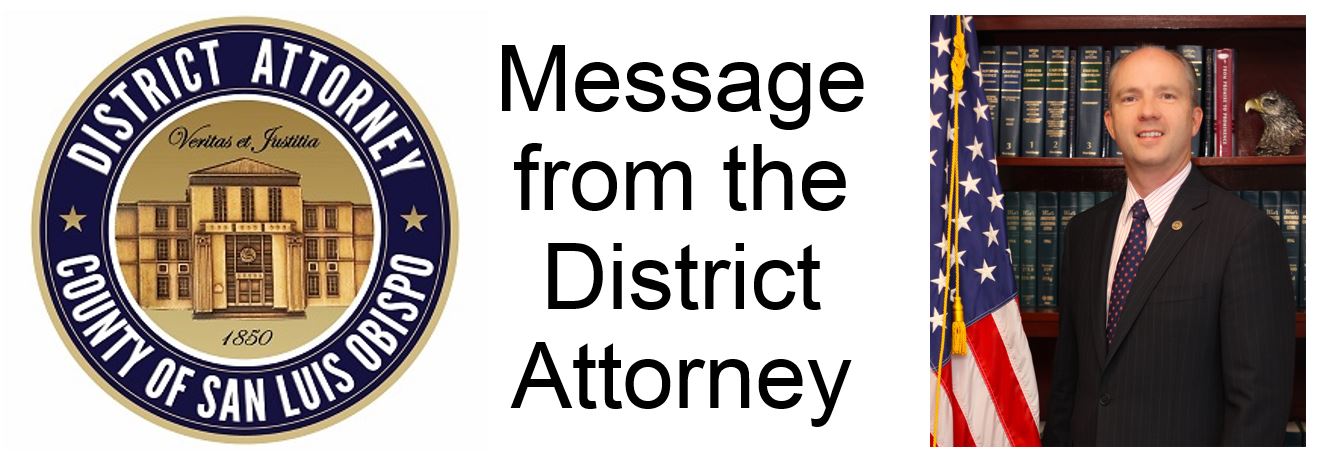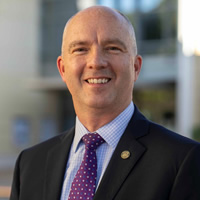
District Attorney Dan Dow Answers Tribune Questions about Not Prosecuting Singing
Author: District Attorney
Date: 7/31/2020 2:43 PM
District Attorney Dan Dow responds to the San Luis Obispo Tribune newspaper after they questioned him about why he issued a declaration that he would not prosecute people for singing in houses of worship. The written questions and District Attorney Dow’s answers will be posted here as well.
District Attorney Dan Dow responds to the San Luis Obispo Tribune newspaper after they questioned him about why he issued a declaration that he would not prosecute people for singing in houses of worship. The written questions and District Attorney Dow’s answers will be posted here as well.
{^youtubevideo|(width)425|(height)264|(rel)False|(autoplay)False|(fs)True|(url)https://www.youtube.com/watch?v=KWjn233gMNM^}
QUESTIONS FROM TRIBUNE REPORTER, MATT FOUNTAIN, AND DISTRICT ATTORNEY DOW'S RESPONSES
1.) How did you come to speak at this event and who was the event for (i.e. was this related to any political party, organization, etc.)?
I attend this public event at Sculpterra Winery every year on July 4th, as a guest of the owner who provides a free Independence Day celebration to all people from the community. The owner has asked me each year to address the gathering and to talk about our nation’s freedom and the importance of celebrating Independence Day. The event includes a classic car show, free food, and live music.
2.) Why did you feel the need to declare SLO County a Sanctuary County for worship?
Because Governor Newsom’s Public Health Department announced three days earlier, on July 1st, that houses of faith must stop singing during their worship services. As District Attorney it is my duty to exercise my prosecutorial discretion in a manner that is just and appropriate. Upon hearing of the new directive, I was compelled to take a position on what I would do if a case was brought to my office.
I am firmly committed to the principle that it would be a severe injustice for my office to charge a person with a crime who has simply chosen to practice their faith by singing in church. In other words, it would simply NOT be in the interest of justice to prosecute someone for singing in their place of worship.
Finally, I call on all people of every faith in our county, our state, our Nation and the World to pray for peace, to pray for healing, to pray for a cure for the Coronavirus that has devastated people all over the globe.
3.) Is it within your authority to do so?
Yes, the prosecution of criminal offenses on behalf of the People of the State of California is the sole responsibility of the public prosecutor who has sole discretion to determine whom to charge, what charges to file and pursue, and what punishment to seek. The prosecutor's own discretion is not subject to judicial control. (Dix v. Superior Court (1991) 53 Cal.3d 442)
The district attorney of each county independently exercises all the executive branch's discretionary powers in the initiation and conduct of criminal proceedings. (People ex rel. Younger v. Superior Court (1978) 86 Cal.App.3d 180)
4.) Have you been receiving communications from the public asking you to take this stand?
No, although I have been asked by many about whether they could be charged with a crime and what would happen to them if they sing in a worship service in violation of the guidance.
5.) Have there been any instances of the county cracking down on gatherings of worship?
The Public Health Department has informed leaders in the faith community, and the community at large, that places of worship may not exercise singing or chanting.
6.) In your open letter to the faith community, you said the county wouldn't enforce gathering restriction until there was further clarification from the higher court. But SCOTUS ruled in support of the California restrictions May 30, before these comments. Have you changed your mind?
Your reference to my May 21, 2020 letter is inaccurate. I said, “this office will not seek criminal enforcement for alleged violations involving those who meet in-person for religious purposes during Phase 2 of the reopening plan so long as social distancing and other health guidelines are followed.”
The California prohibition substantially changed after I wrote my letter and before the Supreme Court’s ruling which was made on a uniquely different issue than was presented when I wrote my letter.
I strongly encourage houses of worship to follow all of the health guidance issued by the state in order to reduce the likelihood of spreading the coronavirus except for the recommendation of not meeting in person and not singing.
I am convinced that it would be severely unjust to seek criminal enforcement against an individual attending a service at their house of worship or a member of the clergy for performing their important leadership duties.
7.) Is this message consistent with the county's Public Health directives?
This is a question for County health officials to answer.
8.) You appear to be nodding when the gentleman in the American shirt says there is no systematic racism in SLO County. Do you agree with that statement?
Please listen to Scott Peterson’s entire statement. He did not say there is no racism in SLO County. He clearly said that there is racism in the country, but he hasn’t seen it in law enforcement. His statement is: “I’ve been a cop for 26 years now, and uh, I know a lot of police officers, I really do. And uh, this whole idea of systemic racism, I know that there is racism in this country, but as a man who has been in the profession for a very long time, I just haven’t seen it.” That is exclusively Mr. Peterson’s statement expressing his unique life experience as a law enforcement officer, not mine.
Sadly, I know all too well that racism exists in the heart of human beings of every race and every background and it is here in our county just like it is in every place where human beings live across the globe. As District Attorney, I take racism very seriously. Under my leadership, we have prosecuted numerous instances of what we call “hate crimes” where evidence of racism is often the determining factor. A “hate crime” is defined in Penal Code 422.55 as a criminal act committed because of one of the following characteristics of the victim: disability, gender, nationality, race or ethnicity, religion, sexual orientation, association with a person or group with one or more of these actual or perceived characteristics.
I am firmly committed to uprooting racism wherever it can be found, whether in the criminal justice system or anywhere else.
9.) Not saying this is the case, but the point has been raised over and over, especially in relation to Ian's video, that SLO County's elected officials will say things before private groups that they wouldn't say to the larger public they serve. How come the majority of residents have to hear your take on this from a private video?
This was not a private group. In fact, its been a widely attended public event that attracts hundreds of people on the Fourth of July each year. The event gets bigger and bigger every year and is a representation of American patriotism and celebrating freedom. The original video is not private and has been posted on YouTube since July 5, 2020. The edited video you were provided was put together by a political opponent in an attempt to construe my comments in a false light.
10.) Lastly, since I have you, the question has been raised to me and on social media: Given your social media post during the July 21 Highway shutdown, do you see any conflict at this point in the Arata/Bautista cases?
No.
11.) And perhaps you want to respond to this quote from [Supervisor] Bruce Gibson, since I didn't exactly ask a question on the separation of church and state intersecting with public policy issue: “This appears to be another of our elected law enforcement officials playing to his far-right base — except what’s quite concerning is that it appears the DA is imposing his religious beliefs to decide which California laws he will choose to enforce. That calls into serious question whether he has the impartial judgment necessary for his position.”
It is unfortunate that the Supervisor is willing to broadly describe people of faith as being “far-right.” Matters of faith are personal and know no political boundary; exercising prudent prosecutorial discretion in every type of case is exactly what the voters elected me to do. While the task of exercising discretion is not always easy, I will not apologize for declining to prosecute people for singing in their house of worship no matter the faith represented. I am very grateful to have deep friendships with people of all faiths within our diverse community and I welcome constructive conversation with all members of our community, even with Supervisor Gibson.
